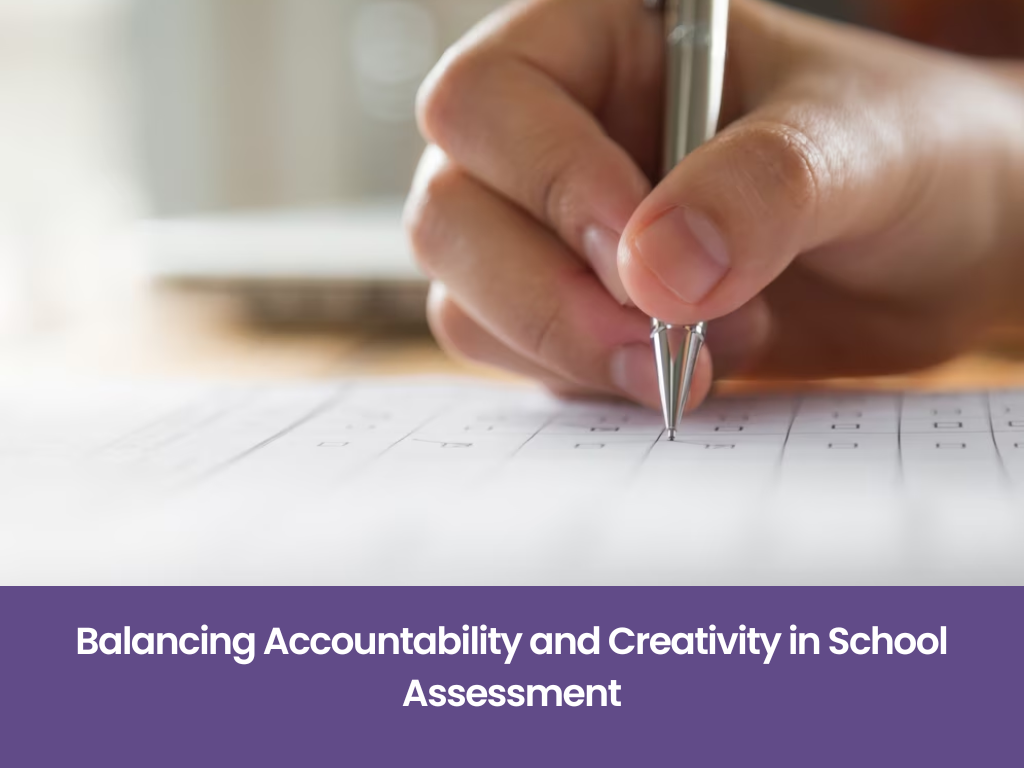Balancing Accountability and Creativity in School Assessment
posted on Feb 05, 2024
Assessment plays a crucial role in education, serving as a means to measure student learning, guide instruction, and inform decision-making.

Introduction:
Assessment plays a crucial role in education, serving as a means to measure student learning, guide instruction, and inform decision-making. However, striking a balance between accountability measures and fostering creativity in assessment practices is essential to ensure that students receive a holistic and meaningful learning experience. At BGS Vijnatham School, educators recognize the importance of balancing accountability with creativity in assessment to promote student growth, engagement, and success. This article explores how school achieves this balance through a multifaceted approach to assessment that values both accountability and creativity.
Understanding Assessment:
Assessment encompasses a range of activities and practices used to evaluate student learning, including tests, quizzes, projects, presentations, performances, and portfolios. While traditional forms of assessment focus on measuring students' mastery of content knowledge and skills, creative assessment approaches emphasize students' ability to think critically, solve problems, and demonstrate understanding in innovative ways. By integrating both types of assessment, School aims to provide a comprehensive and enriching learning experience that fosters academic excellence and creativity.
Balancing Accountability and Creativity:
Standards-Based Assessment:
School utilizes standards-based assessment to ensure that students meet academic standards and learning objectives. Standards-based assessment aligns with curriculum standards and benchmarks, providing clear expectations for student learning and achievement. By assessing student performance against established criteria, educators can identify areas of strength and areas for improvement, providing targeted support and intervention as needed.
Authentic Assessment:
In addition to standards-based assessment, it incorporates authentic assessment practices that allow students to apply their learning in real-world contexts. Authentic assessments may include project-based tasks, performance-based assessments, simulations, and real-world problem-solving activities. By engaging students in authentic tasks that mirror the complexities of the real world, educators assess students' ability to transfer knowledge and skills to practical situations, fostering creativity, critical thinking, and problem-solving skills.
Formative Assessment:
Formative assessment plays a vital role in the learning process in schools, providing ongoing feedback and support to students as they progress towards mastery of learning objectives. Formative assessments may include quizzes, discussions, peer feedback, self-assessments, and classroom observations. By monitoring student progress in real-time and providing timely feedback, educators can identify misconceptions, adjust instruction, and scaffold learning experiences to meet the diverse needs of students.
Summative Assessment:
Summative assessment measures student achievement and mastery of learning objectives at the end of a unit, course, or academic year. While summative assessments are important for accountability purposes, BGS Vijnatham School strives to make them meaningful and relevant to students' learning experiences. Summative assessments may include traditional tests, culminating projects, presentations, and performances that allow students to demonstrate their understanding and application of knowledge and skills in authentic ways.
Promoting Creativity in Assessment:
Choice and Flexibility:
The school provides students with choice and flexibility in assessment tasks, allowing them to demonstrate their learning in ways that align with their interests, strengths, and preferences. By offering a variety of assessment options, such as written essays, multimedia presentations, artistic projects, and oral performances, educators tap into students' creativity and promote self-expression, autonomy, and engagement in the learning process.
Project-Based Learning:
Project-based learning (PBL) is a cornerstone of assessment, providing students with opportunities to apply their learning to real-world projects and inquiries. PBL tasks may involve research, problem-solving, collaboration, and innovation, allowing students to explore topics of interest in depth and develop 21st-century skills such as critical thinking, communication, and creativity. By engaging in project-based assessments, students become active participants in their learning, driving their own inquiries and creating meaningful artifacts of their understanding.
Performance-Based Assessments:
Performance-based assessments, such as presentations, debates, speeches, and performances, provide students with platforms to showcase their knowledge, skills, and talents in dynamic and expressive ways. By engaging in performance-based assessments, students develop confidence, communication skills, and presentation abilities, while also demonstrating their understanding of academic content. Performance-based assessments promote creativity, self-expression, and authentic learning experiences that go beyond traditional tests and quizzes.
Portfolio Assessment:
Portfolio assessment allows students to compile evidence of their learning, growth, and achievements over time, showcasing their progress and accomplishments across various subjects and activities. Portfolios may include samples of student work, reflections, self-assessments, and goal-setting activities that demonstrate their learning journey and development. By engaging in portfolio assessment, students reflect on their learning experiences, set goals for improvement, and take ownership of their academic and personal growth.
Conclusion:
Balancing accountability and creativity in school assessment is essential to promote student learning, engagement, and success. At BGS Vijnatham School, educators employ a multifaceted approach to assessment that integrates standards-based assessment with authentic, formative, and summative assessment practices. By providing choice, flexibility, and opportunities for creativity in assessment tasks, the school empowers students to take ownership of their learning, pursue their interests, and demonstrate their understanding in meaningful and authentic ways. As educators continue to refine their assessment practices, they remain committed to fostering a culture of academic excellence, creativity, and innovation that prepares students for success in school and beyond.